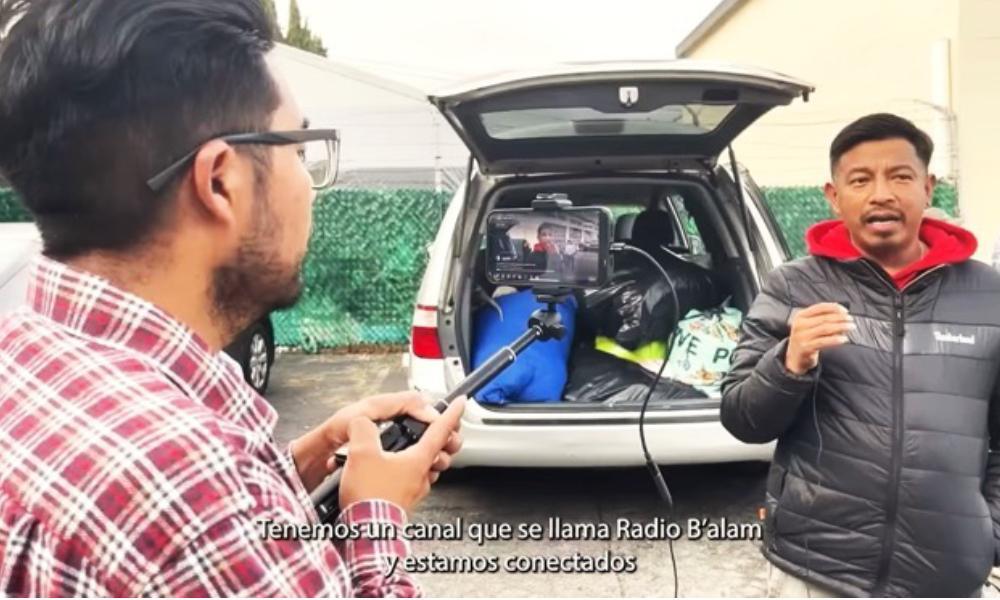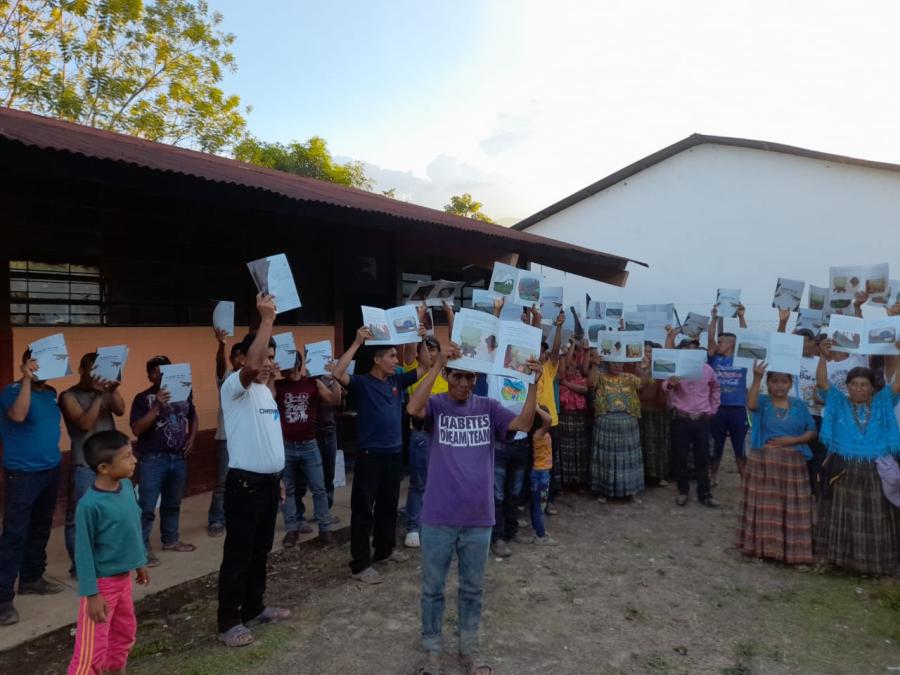
By Radio B'alam - Voces Mayas
In the neighborhoods of Oakland, California, you’ll hear the rhythms of marimba music, see colorful traditional clothing, and hear the distinct sounds of the Mayan Mam language being spoken. Fleeing the civil wars in Guatemala during the 1980s, many Mam people sought refuge in the U.S. Over the decades more have continued to migrate, and today Oakland is home to thousands of Mam people—one of the largest concentrations of Mam people outside Guatemala.
“People at the border asked me if I had a place to go. Oakland came to mind because I had heard that people from Todos Santos go to Oakland,” says Crecencio Ramirez (Mam), co-founder of Radio B’alam – Voces Maya. Ramirez arrived in the U.S. alone as a teenager and, like many of his fellow citizens, has endured some struggle settling here. Mam immigrants face a multiplicity of hardships, including intergenerational trauma, discrimination, cultural or linguistic barriers, financial stress, and isolation. Labeled as “Latinx” upon migrating to the U.S., their unique Indigenous identity is too often overlooked.
Many Mam people used to hide their identities, speaking their native language only in whispers and adapting to cultural norms to assimilate. Over time, Mam people became so used to discrimination that they often felt it was normal. The trauma that people have been through in Guatemala and on their journey to the U.S., compounded by the constant fear and elevated threat of deportation or uncertainty about their future, makes it difficult, if not impossible, for many to speak up.
The birth of Radio
When the COVID pandemic began in 2020, the Mam community faced heightened isolation and uncertainty. Many lost their income and were facing mounting bills and increased health risks. Language barriers exacerbated lack of access to information and support services, amplifying the challenges they were already facing.
Like many Indigenous languages, Mam is an oral tradition. Ramirez, together with other young Mam leaders, came up with the idea of speaking to the community directly in Mam through Facebook Live. This was the beginning of Radio B’alam - Voces Maya, the first community-led internet radio broadcast in the U.S. dedicated to Mam people. The first program aired in December 2020, providing critical information in Mam about COVID vaccines, testing, virtual schooling, and food distribution.
The community’s needs were clear. What began with just 100 listeners quickly grew to 10,000, then 30,000. Today, Radio B’alam reaches over 76,000 listeners, not just in the Bay Area, but across the U.S. and even in Guatemala.
The program has evolved into much more than a COVID response—it has become a trusted source of information and guidance. Many experts join to share vital information, which is translated and contextualized for Mam audiences. We cover a range of topics, such as healthcare, legal rights, school systems, mental health, women’s rights, and public benefits. Support from Cultural Survival, along with other partners, has been essential in this process, for which we are deeply grateful.
We also livestream community news from Guatemala and Mam cultural events like weddings, funerals, graduation ceremonies to share these moments with families and friends in the U.S. or Guatemala. By celebrating our identity, our programs revitalize community solidarity and cultural pride. Esmeralda Mendoza (Mam), co-founder of Radio B’alam - Voces Maya, comments, “I do not want to be that person who hides that we are Mam. I want to help Mam people have access to the information and tools we need to be change agents in our own communities and the broader society.”
“We want our kids to feel that this is their home. We are not scared anymore. We are proud of our culture and see our community growing stronger. We see ourselves on every street corner, and it feels like home,” adds Ramirez.
Community advocacy
The success of Radio B’alam has become a powerful tool for both self- and community advocacy. One major accomplishment this past year was establishing a relationship with the Alameda County Public Defenders’ Office to counter discrimination by police officers against Indigenous immigrant community members in Oakland and surrounding areas. Mam people are often misidentified as Latinx and denied their right to an interpreter in their language, and because of their past trauma related to authorities, they often shut down and don’t understand why they are being arrested.
After a series of meetings, we developed a declaration outlining who Mam people are, how they are different from Spanish-speaking Latinxes, why Mam speakers may be hesitant to disclose their Indigenous identity, and what certain Mam behaviors like body gestures may mean. This declaration is now being used in court to help build awareness within the legal system about the existence and needs of the Mam-speaking population. A Public Defenders’ Office representative joined Radio B’alam and explained to our listeners their rights and how to protect themselves if pulled over by a police officer. This program was well received, with over 15,000 views.
In this time of political crisis and growing hostility towards immigrants, we are continuing our work to mobilize and protect our community. In partnership with other pro-immigrant community organizations, we have developed a rapid response strategy to support Mam people facing urgent threats. We are offering “Know Your Rights” training sessions on Radio B’alam, informing Mam people at risk of deportation raids about what to do if approached by U.S. Immigration and Customs Enforcement (ICE). Many Mam people are not aware of their right to remain silent, request a lawyer, or ask for an interpreter, and may unknowingly consent to searches or detention.
These training opportunities are critical to empower Mam people. We also collaborate with lawyers to explain the current immigrant policies and answer people’s questions in real time. This is why we are not only “Radio B’alam,” but we also “Voces Maya”—we are voices for the Mam people, and we help Mam people find and use their own voice.
In 2024, Radio B’alam - Voces Mayas received a grant from Cultural Survival’s Indigenous Community Fund, which provides opportunities for international Indigenous radio stations to strengthen their infrastructure and broadcast systems and creates training opportunities for journalism, broadcasting, audio editing, technical skills, and more for radio journalists from Indigenous communities around the world. In 2024, the Fund provided $480,000 in grants to 57 Indigenous communication projects benefiting Indigenous communities in 25 countries across the Americas, Africa, and Asia, including Argentina, Bangladesh, Bolivia, Botswana, Brazil, Chile, Ecuador, Colombia, the Democratic Republic of Congo, El Salvador, Guatemala, India, Kenya, Mexico, Nepal, Nigeria, Peru, the Philippines, Senegal, South Africa, Tanzania, the United States, Venezuela, and Zimbabwe.


